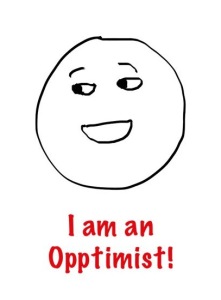 What do you think of when you think of an optimist?
What do you think of when you think of an optimist?
Probably since I first heard the story of Pollyanna, I thought it meant someone who was Pollyanna-ish, being foolishly or blindly optimistic. And that is definitely not me. But a few weeks ago, I heard something that made me re-think my position and I realized that I am an optimistic.
I was driving around West L.A. running an errand and the Dennis Prager show was on the radio. It was a regular Friday segment called the Happiness Hour (Dennis wrote the book “Happiness Is A Serious Problem”). Dennis talked about optimism having two definitions and as he elaborated, I had an “AHA!” moment. I realized that I am an optimist and that’s why I am generally happy.
Dennis explained that there are two definitions for optimism. The first definition is to expect the best possible outcome. The Pollyanna definition. By that definition, Dennis is not an optimist and neither am I.
I was a Pollyanna optimist as a child and was often disappointed. I then became a pessimist who expected a bad outcome and would be happy when things weren’t as bad as I expected. But that wasn’t a source of happiness either and resulted in needless worry and fretting about things that never come to pass.
Over time, my outlook evolved to what Dennis explained as the second definition of optimism which is focusing on the most hopeful aspects of any situation.
Bingo! I got it. I am an optimist. I realize that in any given situation I cannot worry about how I got there. I can review that later and see if I can do anything to prevent a repeat occurrence. But I can look at all the possible options and choose what I think is the best path forward. Stephen Covey talks about that in habit 1 of his 7 Habits of Highly Effective People. We are free to choose and responsible for our choices. I have chosen to own my future and know I can make a choice to select what I feel is the best chance at a good outcome.
Let me give an example of going to a Doctor’s appointment and being seen 45 minutes after the scheduled appointment time. The Pollyanna optimist expects the Doctor to see them on time and is very disappointed when the doctor is late. The Pessimist expects the doctor to be at least two hours late and is unhappy all day before going to the doctor, just dreading the 2 hour wait. Then they are pleasantly surprised that the doctor was only 45 minutes late. But the second definition optimist brings a book along. If the doctor is on time, great and if the doctor is late, great, too, because they can catch up on some reading.
A simplistic example but I am much happier by being a second definition optimist.
The choice is yours – you can be Pollyanna or you can be a pessimist. Or, you can focus on the most hopeful aspects of any situation.



